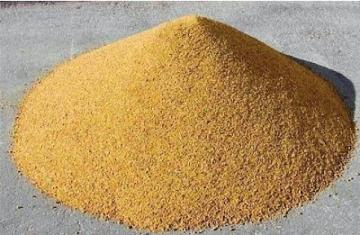
Grain distilling by-products
Grains are fermented and distilled to yield ethanol or acetone butanol. The by-products from grain distilleries vary in chemical composition according to the type of grain and the process employed. The most commonly used grains are rye, wheat and maize. The two most important processes are outlined below.
The British method
The grains are crushed, and the grain starch is converted into sugars by adding malt. The sugars are extracted and the grains are screened off, either to be dried or used as wet feed for animals. Yeast is added to the wort for fermentation. The alcohol is distilled from the fermented liquor, after which the alcohol-free effluent (spent wash) containing the yeast may be dried to yield dried distiller’s solubles. Alternatively, the spent wash may be centrifuged and the solids dried into distiller’s concentrate, which is similar in composition to the solids, or dried dreg, collected from the spent wash by sedimentation.
The American method
The grains are converted by adding malt, and the whole mixture is passed forward to the fermenting vessel, where yeast is added. After fermentation the whole mixture, including the grain, is distilled. The alcohol-free effluent, or whole stillage, from the still is then passed over a screen to separate the grain from the liquid. This liquid, called thin stillage, which contains the yeast, is condensed and may be dried into distiller’s solubles. In some plants the thin stillage is centrifuged before being condensed and the solids are added to the grain.
Distiller’s spent grain
Distiller’s spent grain is not as palatable as brewer’s spent grain, but it contains more crude protein and less fibre. It can be fed fresh, ensiled or dried by the same method and in the same quantities as brewer’s grain. Distiller’s spent grain with distiller’s solubles has been included up to 15% in diets with no change in performance. The addition of calcium carbonate to the diet (40g for cows and 10g for sheep/day) increases the digestibility of distiller’s spent grain.
Distiller’s solubles
Distiller’s solubles are valued for their growth factors and as a source of B-vitamins. It is doubtful whether distiller’s solubles promote growth in cattle, but it has been claimed that they contain a rumen-stimulating factor that increases cellulose digestion. The growth- promoting effects in pigs and poultry have been clearly demonstrated. In most cases the addition of 5-10% dried distiller’s solubles increased the productivity of both classes of animals. The use of distiller’s solubles as the major source of protein has been less successful owing to their poor palatability. Nevertheless, they have been included up to 20% in calf starters.
